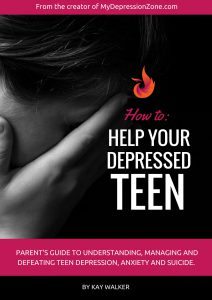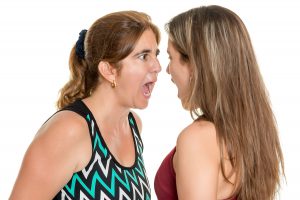 Depression in teens doesn’t always look like depression that is seen in adults. Here’s a guide that you can follow to see if your teen may be suffering from what doctor’s call a disorder called “major depression”.
Depression in teens doesn’t always look like depression that is seen in adults. Here’s a guide that you can follow to see if your teen may be suffering from what doctor’s call a disorder called “major depression”.
As always, this is for informational purposes only and you should ALWAYS consult a doctor or qualified medical professional get a firm diagnosis. I always recommend getting a diagnosis from two different doctors.
Major depression is a medical disorder. Here are the criteria used by doctors to diagnose it:
1) Five or more of the following symptoms have been present during the same two-week period and represent a change from previous functioning; at least one of the symptoms is either (a) depressed mood or (b) loss of interest or pleasure.
- Depressed mood most either subjective report (e.g., feels sad or empty) or observation made by others (e.g., appears tearful). Note: In children and adolescents, can be irritable mood
- Markedly diminished interest or pleasure in all, or almost all, activities most of the day, nearly every day (as indicated by either subjective account or observation made by others).
- Significant weight loss when not dieting or weight gain (e.g., a change of more than 5 percent of body weight in a month), or decrease or increase in appetite nearly every day. Note: In children, consider failure to make expected weight gains.
- Insomnia or hypersomnia nearly every day.
- Psychomotor agitation or retardation nearly every day (observable by others, not merely subjective feelings of restlessness or being slowed down).
- Fatigue or loss of energy nearly every day.
- Feelings of worthlessness or excessive or inappropriate guilt (which may be delusional) nearly every day (not merely self- reproach or guilt about being sick).
- Diminished ability to think or concentrate, or indecisiveness, nearly every day (either by subjective account or as observed by others).
- Recurrent thoughts of death (not just fear of dying), recurrent suicidal ideation without a specific plan, or a suicide attempt or a specific plan for committing suicide.
2) The symptoms cause clinically significant distress or impairment in social, occupational or other important areas of functioning.
3) The symptoms are not due to the direct physiological effects of a substance (e.g., a drug of abuse, a medication) or a general medical condition (e.g., hypothyroidism).
How do I know if my teen is depressed?
Additional symptoms specific to teens and children:
- Persistent sad or irritable mood
- Frequent, vague, non-specific physical complaints
- Frequent absences from school or poor performance from school
- Being bored
- Alcohol or substance abuse
- Increased irritability
- Anger or hostility
- Reckless behavior
***
Have you been wondering: How do I know if my teen is depressed? Teen depression recovery expert Kay Walker answers all those questions in her book: How to Help Your Depressed Teen and The Feel Better Now Book.
Click below for more details…

 4) “What kind of thoughts are you having?”
4) “What kind of thoughts are you having?” 